Key takeaways:
- Eco-conscious living trends emphasize impactful choices like energy-efficient appliances, sustainable materials, and minimalism.
- Incorporating sustainable materials, such as bamboo and recycled glass, contributes to environmental conservation and supports local communities.
- Enhancing indoor air quality and utilizing natural light can significantly improve living spaces and well-being.
- Adopting zero-waste practices, like composting and bulk shopping, encourages a commitment to sustainability and reduces waste.
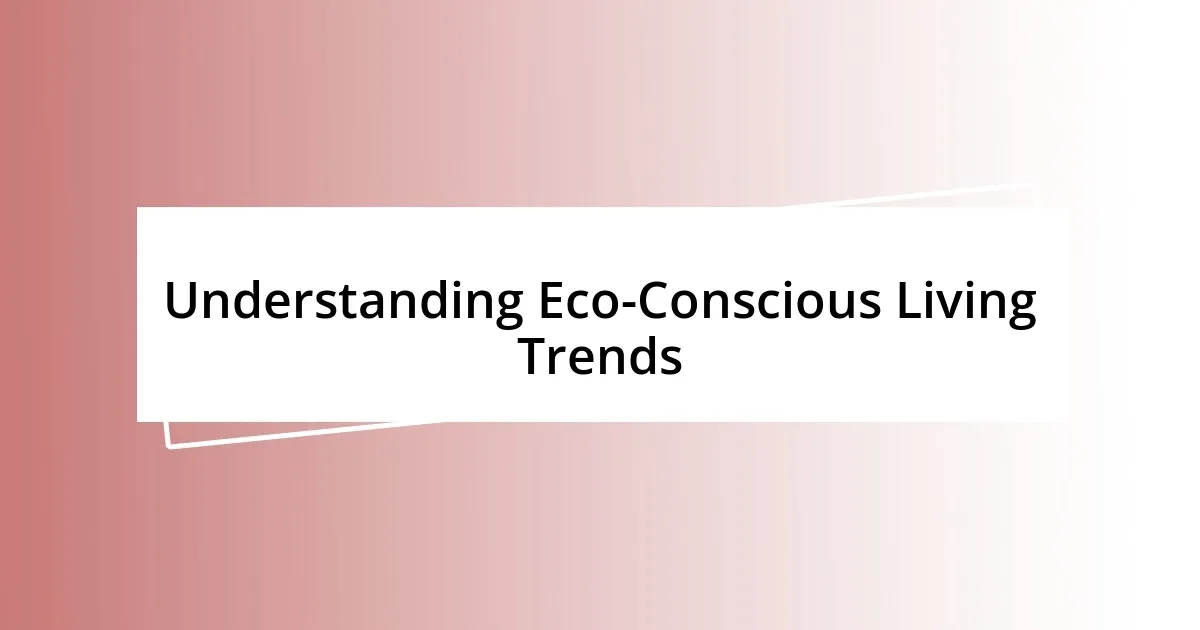
Understanding Eco-Conscious Living Trends
Eco-conscious living trends are increasingly prioritized as individuals recognize the direct impact of their choices on the environment. I remember when I first decided to invest in energy-efficient appliances; the initial cost was daunting, but the long-term savings and reduced carbon footprint made it worthwhile. Isn’t it fascinating how our small choices can lead to significant positive changes?
Another trend I’ve noticed is the rising popularity of sustainable materials in home décor. Have you ever touched a piece of furniture made from reclaimed wood? The textures and stories behind each piece bring a unique character to my living space. It’s not just about aesthetics; it’s about making deliberate choices that honor our planet’s resources.
Moreover, many are embracing minimalism to reduce waste and consumption. I still recall the liberating feeling of decluttering my space, focusing on quality over quantity. This lifestyle shift not only deepens our appreciation for what we own but also challenges us to reflect on what truly adds value to our lives. Isn’t it invigorating to think about what we can gain by letting go of excess?
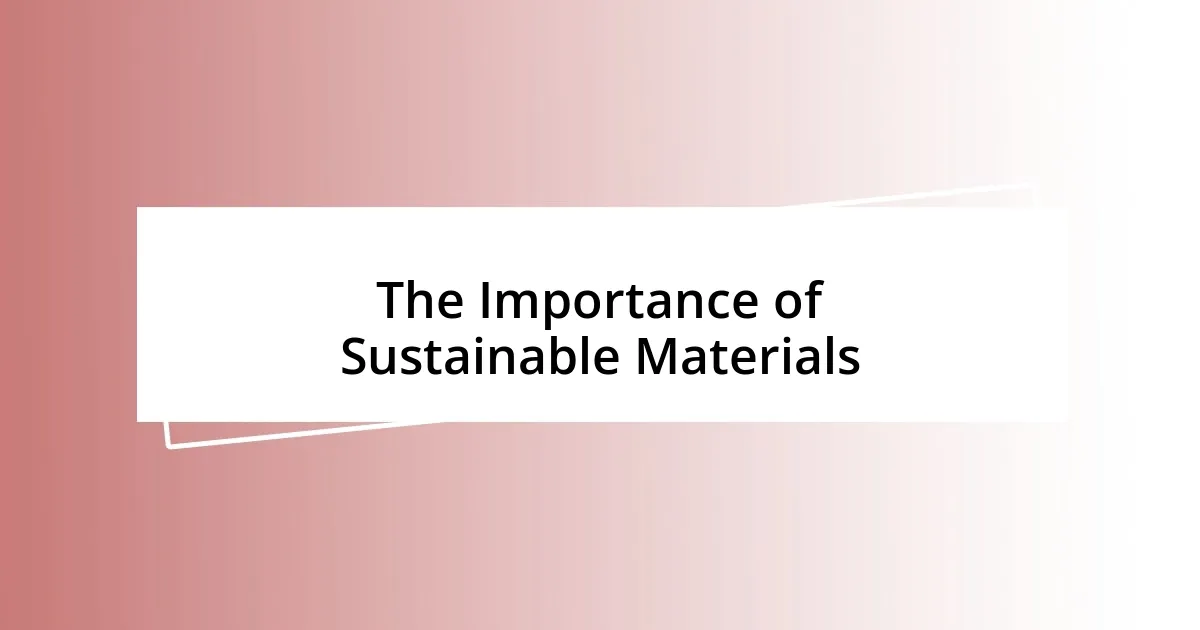
The Importance of Sustainable Materials
Sustainable materials play a crucial role in eco-conscious living. I still recall the first time I installed bamboo flooring—it felt warm and inviting underfoot, plus I learned it’s incredibly renewable. By opting for materials like bamboo or recycled metal, we not only create beautiful homes but also contribute to conserving our planet’s resources. Have you ever considered how the materials you choose impact not only your home but the world around you?
When I see design choices that incorporate sustainable materials, I feel a sense of pride. For example, using recycled glass for countertops not only reduces waste but adds a stunning visual element to your kitchen. Each piece tells a story of transformation and sustainability, making daily life a bit more meaningful. During my last renovation, choosing locally sourced wood gave my home a unique touch and supported local artisans. It felt great to know my choices were positively impacting the community.
Exploring sustainable materials has also heightened my awareness of the bigger picture. I now think twice about what goes into my home and how it affects the environment. For instance, sourcing organic cotton for textiles instead of conventional cotton made me realize the difference I could make with my choices. This journey has shaped my buying habits and influenced my friends, sparking conversations around sustainable living that I never would have initiated before.
| Sustainable Material | Environmental Benefit |
|---|---|
| Bamboo | Rapidly renewable, requires less water and pesticides |
| Recycled Glass | Reduces landfill waste, energy-efficient production |
| Locally Sourced Wood | Supports local economies, reduces transportation emissions |
| Organic Cotton | Non-toxic, less water pollution from farming practices |
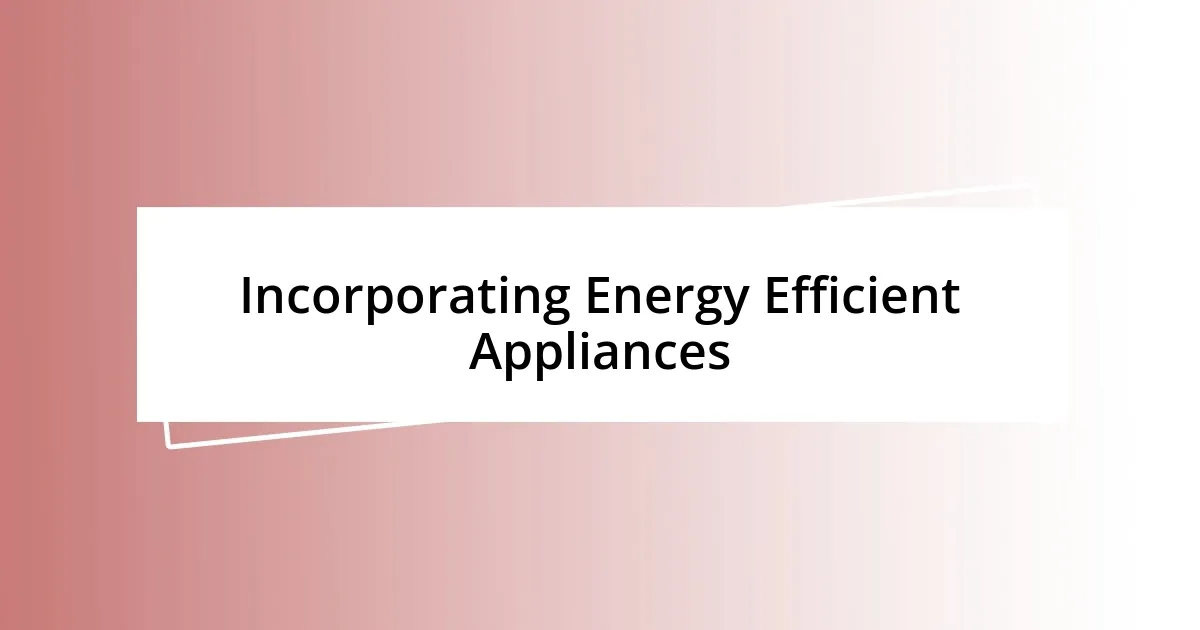
Incorporating Energy Efficient Appliances
When I decided to upgrade my home appliances, I was surprised by how many energy-efficient options were available. Investing in an Energy Star-rated refrigerator not only helped lower my monthly bills, but it also made me feel like I was doing my part for the planet. I love knowing that my choice contributes to a smaller carbon footprint, and each time I open that fridge, I’m reminded of my commitment to sustainability.
Here are some key features to look for in energy-efficient appliances:
- Energy Star Certification: This label indicates that the appliance meets strict energy efficiency guidelines set by the U.S. Environmental Protection Agency.
- Smart Technology: Devices that can learn your usage patterns and optimize performance to save energy.
- High Efficiency Ratings: Appliances with a high Combined Energy Efficiency Ratio (CEER) help reduce electricity usage.
- Eco-Friendly Materials: Look for appliances made with recyclable materials or environmentally friendly components.
- Water Efficiency: Focus on appliances that minimize water waste, crucial for conserving resources like dishwashers and washing machines.
Ultimately, my journey became about more than just savings; it transformed into an ongoing dialogue with myself about how choices can align with my values. And I now find myself proudly sharing my experiences, encouraging friends to consider those small changes, which collectively make a significant impact.

Designing for Indoor Air Quality
Designing for indoor air quality has become one of my top priorities in creating a healthy living space. I remember the sense of relief I felt when I installed a high-efficiency air filter system; it drastically improved the air I breathed. Have you ever noticed how fresh air can instantly enhance your mood? I truly believe that the quality of our indoor environment is just as crucial as outdoor air quality.
Another change that made a significant difference was choosing low-VOC (volatile organic compounds) paints and finishes. I can still recall the fresh smell of paint from my recent bedroom makeover—not from harmful fumes but from the eco-friendly options I selected. It was truly liberating to know my environment was safer for my family and me. What a game-changer it was to create a beautiful space without compromising the air we breathe.
Lastly, incorporating houseplants into my home was a delightful surprise. Not only do they add a vibrant touch to my decor, but plants like peace lilies and snake plants also help purify the air. I remember the moment I placed a snake plant on my desk; it felt as if I had invited a small piece of nature indoors. There’s something so fulfilling about fostering healthy air while enriching my surroundings. Have you considered adding plants to your home? It’s an easy yet impactful way to breathe easier.

Utilizing Natural Light in Spaces

Utilizing Natural Light in Spaces
When I started redesigning my living room, one of my main priorities was to let more natural light in. I removed heavy drapes and opted for sheer curtains, which completely transformed the feel of the space. Have you ever noticed how a bright room can just lift your spirits? The difference was palpable; the sunlight streaming in made my home feel airy and inviting, and I found myself spending more time in that room than ever before.
Additionally, I invested in strategically placed mirrors to reflect light throughout my home. I remember the first time I walked into my hallway after doing this; it felt like an entirely new space! It’s fascinating how something as simple as positioning a mirror can amplify the natural light, creating a warm ambiance without the need for extra electrical lighting. Have you thought about how you can play with reflections in your own home?
In my kitchen, I replaced solid cabinet doors with glass fronts, which not only brightened the room but made it feel more open. Seeing my neatly organized dishes and spices displayed in the sunlight created a sense of joy each morning as I prepared breakfast. It’s amazing how incorporating natural light can make daily routines feel like a pleasant ritual, rather than just a chore. Why not consider how small changes could illuminate your own space and enhance your daily experiences?
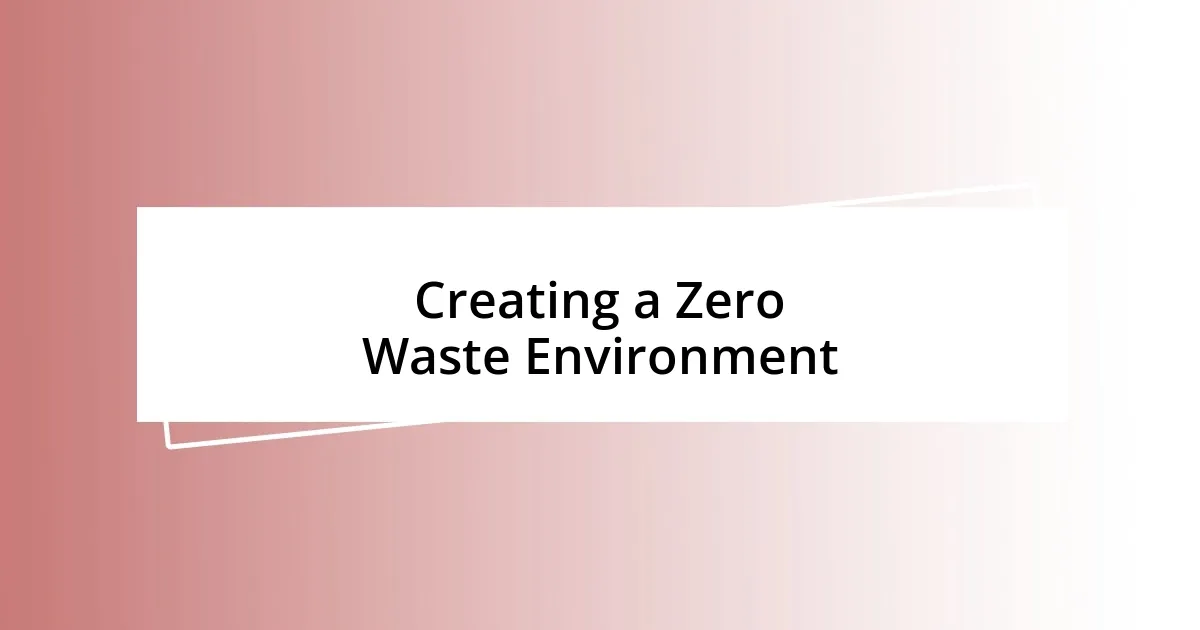
Creating a Zero Waste Environment
Creating a zero-waste environment is something I’ve found both rewarding and transformative. When I first made the switch to reusable products, I felt a sense of empowerment. For example, I ditched paper towels for washable cloths, and the difference in waste was immediate. Have you ever thought about how much paper you use in a week? It’s astonishing when you start tracking it!
One of my favorite zero-waste initiatives was starting a compost bin in my kitchen. I remember the first time I added vegetable scraps; it felt like I was giving back to the earth. The smell of fresh soil from the compost was invigorating, and knowing that I was reducing landfill waste made my heart swell with pride. Have you considered composting? It’s a simple act that creates rich soil for gardening while cutting down on waste—what a win-win!
I also discovered that buying in bulk can drastically reduce packaging waste. I recall my first trip to a bulk store; I was initially overwhelmed, but what a thrill it was to fill my jars with grains and snacks! Each time I refill my containers, I’m reminded of my commitment to sustainability. How has bulk shopping changed your perspective on grocery shopping? It’s a chance to save money and help our planet at the same time!
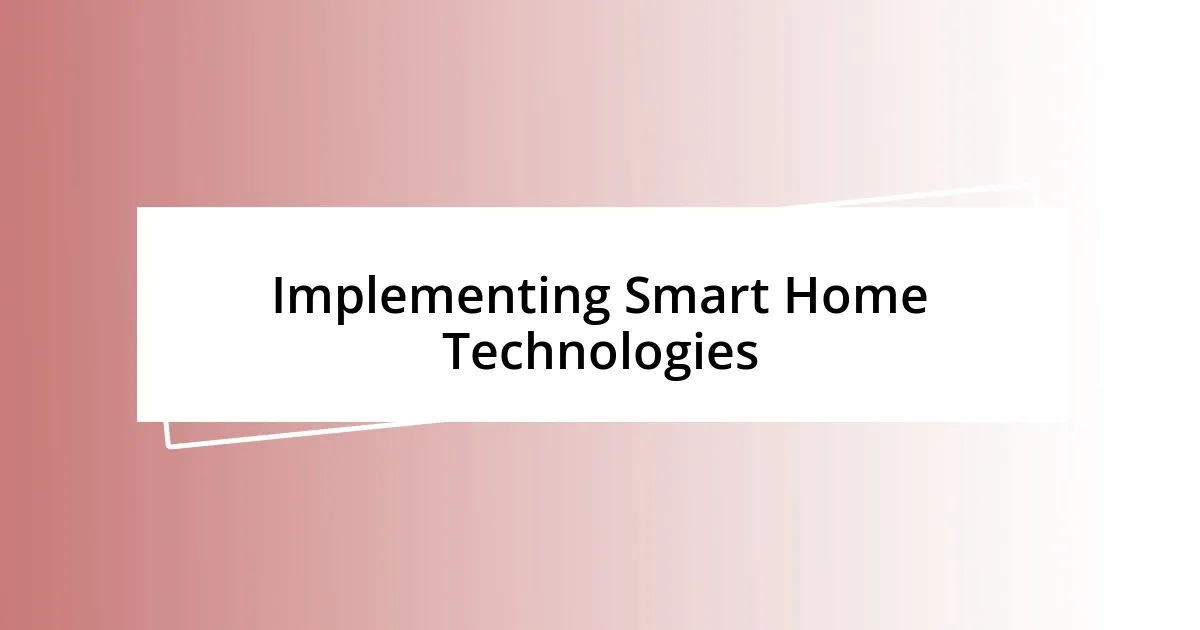
Implementing Smart Home Technologies
Implementing smart home technologies has revolutionized how I approach energy efficiency in my home. When I first installed a smart thermostat, I was amazed at how much control I had over my heating and cooling. It was as if my house was finally listening to my needs—automatically adjusting the temperature based on my schedule. Have you ever noticed how much differences in temperature can affect your comfort levels?
I’ve also started using smart lighting, and let me tell you, it’s been a game-changer! I can set my lights to gradually brighten in the morning, mimicking a natural sunrise. The first time I experienced that gentle increase in light, I felt more energized and ready to embrace the day. Have you thought about how your lighting affects your mood?
Most recently, I embraced smart plugs to monitor energy usage on appliances. I remember checking the app and being shocked by how much power some of my devices consumed even when they weren’t in use! Now, I can turn them off with a simple tap on my phone, which not only saves energy but also gives me peace of mind. Isn’t it comforting to know that I can contribute to a more eco-friendly household, even from afar?














